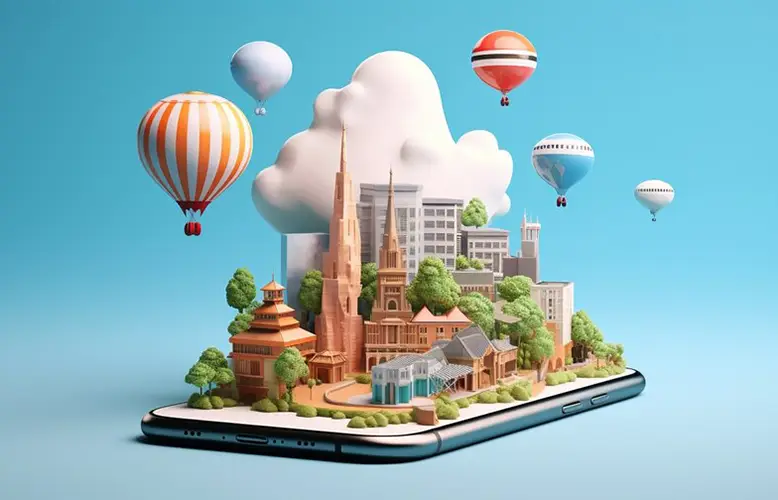Technology continues to reshape the travel and hospitality industry, with mobile technology playing a pivotal role in enhancing traveler convenience, engagement, and satisfaction. Today’s travelers use various mobile devices to pre-check into hotels, schedule activities, and purchase services during their stays.
Mobile devices have become essential travel planning tools, now surpassing traditional travel agents. According to recent studies, 53% of travelers prefer accessing loyalty rewards through mobile apps, and 51% are more likely to use these apps for planning trips and earning rewards.
With American consumers making 2.29 billion domestic trips and 93 million international trips annually, and 80% planning to travel more in the coming months, understanding the impact of mobile technology on travel rewards is crucial.

Mobile Technologies and Environmental Sustainability
Tourism is an integral part of the economy of many countries, but this does not mean that it cannot be sustainable. The trend of people spending 130% more on travel each year highlights the desire to explore new places.
Eco-friendly travel apps help you manage your trips more efficiently and control more parameters, including emissions and carbon footprint. No more outdated methods or language barriers—these apps assist with navigating cultures, reducing homesickness, and more.
In 2019, over one billion people used travel apps, and 65% of the 1.5 billion global travelers booked trips via smartphones. This shift supports a more sustainable approach to tourism.
The Impact of Mobile Technology
Carbon Footprint Reduction
Digitization has greatly reduced the tourism sector’s carbon footprint. If you decide to replace physical documents with e-tickets, you will be able to save paper and thus slightly reduce your negative impact on the world around you. Moreover, online booking platforms and ticket purchasing services allow you to create electronic tickets and use them equally with paper ones. Intelligent lighting and air-conditioning systems in hotels, as well as car-sharing options like electric bikes and scooters, further cut energy use and greenhouse gas emissions.
Digitalization is also associated with certain difficulties, in particular, lack of memory or inconvenient sorting of information. There is also a solution, like phone cleaner, which works on the basis of AI. When you launch Cleanup App – Phone Cleaner, the service finds similar photos on the device and deletes them. This phone app can also organize contacts, as well as create a secure section for storing data.
Transportation
Transportation has always been a key source of carbon emissions. Mobile technology helps minimize these emissions through ride-sharing services like Uber and Lyft. There are also public transportation apps that help plan routes, buy tickets, and all this in real time. This reduces the need for personal transportation. Even if this need remains, you can choose car rental services that have electric or hybrid cars.
Electric scooters and bike-sharing programs, managed through mobile apps, offer eco-friendly alternatives for short-distance travel. Companies like Lime and Bird allow users to locate, unlock, and pay for scooters or bikes using their smartphones. These micro-mobility solutions are primarily aimed at reducing emissions, but they also have a positive impact on traffic in urban areas.
Planning and Information Accessibility
Mobile technology has revolutionized travel planning. In the past, travelers relied heavily on guidebooks, travel agents, and word of mouth. Today, a world of information is at one’s fingertips. At the tap of a finger, we now have apps like Google Maps, TripAdvisor, and Lonely Planet. This is a source of information on everything related to accommodation, food and the attitude of service providers to the environment.
Weather apps are actually more functional. It’s just that most people use them solely to check the temperature and the probability of precipitation. But you can also check air quality or use carbon footprint calculators. For instance, a traveler can check air quality before deciding to visit a particular city, thereby avoiding areas with high pollution levels. This level of awareness was unimaginable just a decade ago.

Challenges and Considerations
While the benefits of mobile technology for sustainable travel are substantial, there are also challenges to consider. The production and disposal of mobile devices have environmental impacts, including resource extraction, energy consumption, and electronic waste. Travelers must balance the benefits of using mobile technology with the environmental cost of the devices themselves.
The over-reliance on mobile technology is more of a threat than an opportunity. Constant connectivity can lead to a focus on virtual interactions rather than immersive, real-world experiences. Finding a balance between the digital and real worlds has always been more challenging than words can convey.
Conclusion
Mobile technology is just a tool that, if used wisely, can be used to benefit nature. This means reduced emissions, demand for greener services, and better travel planning. Those who practice conscious use of the Earth’s resources will benefit from their smartphone and apps.





